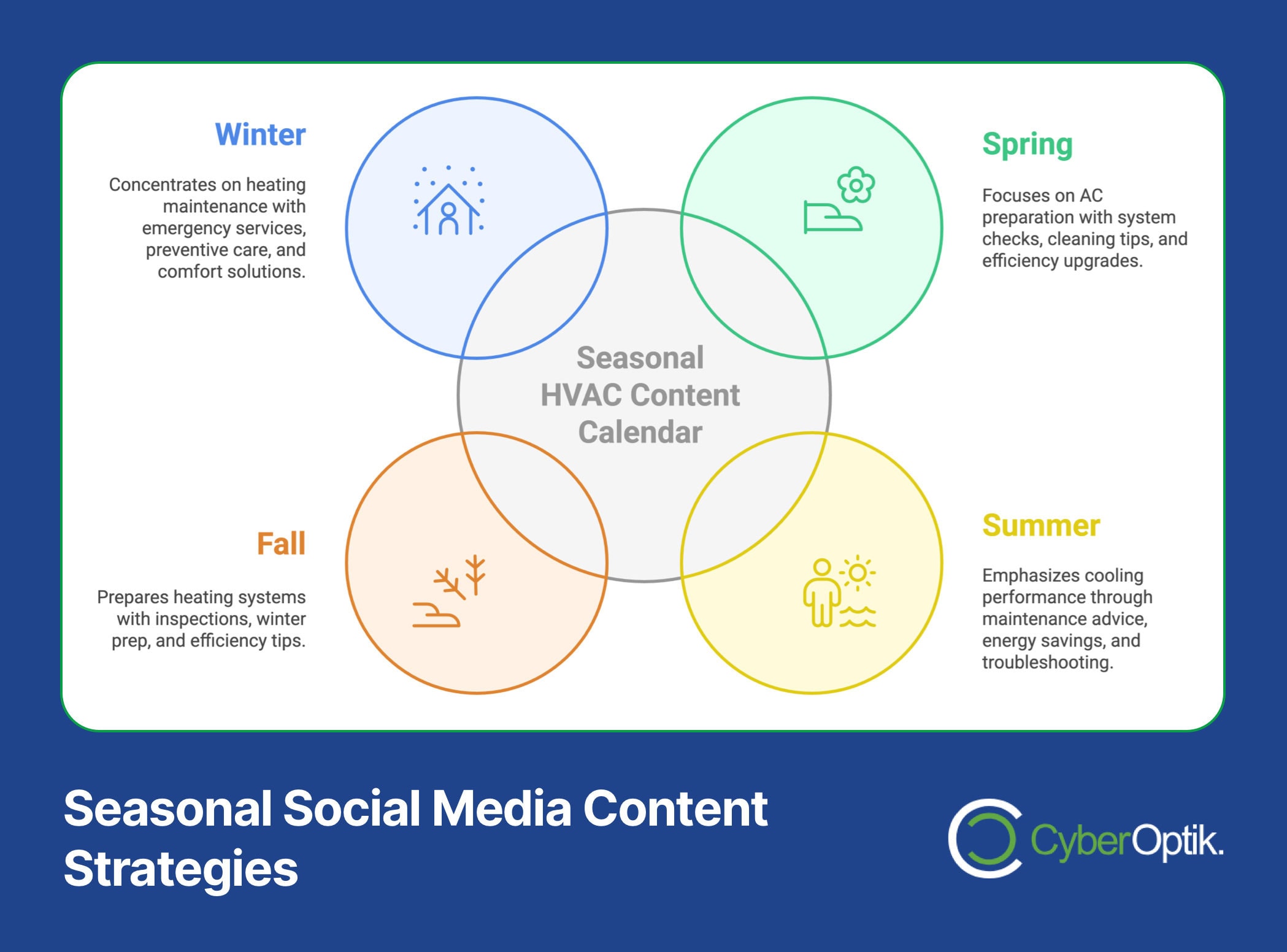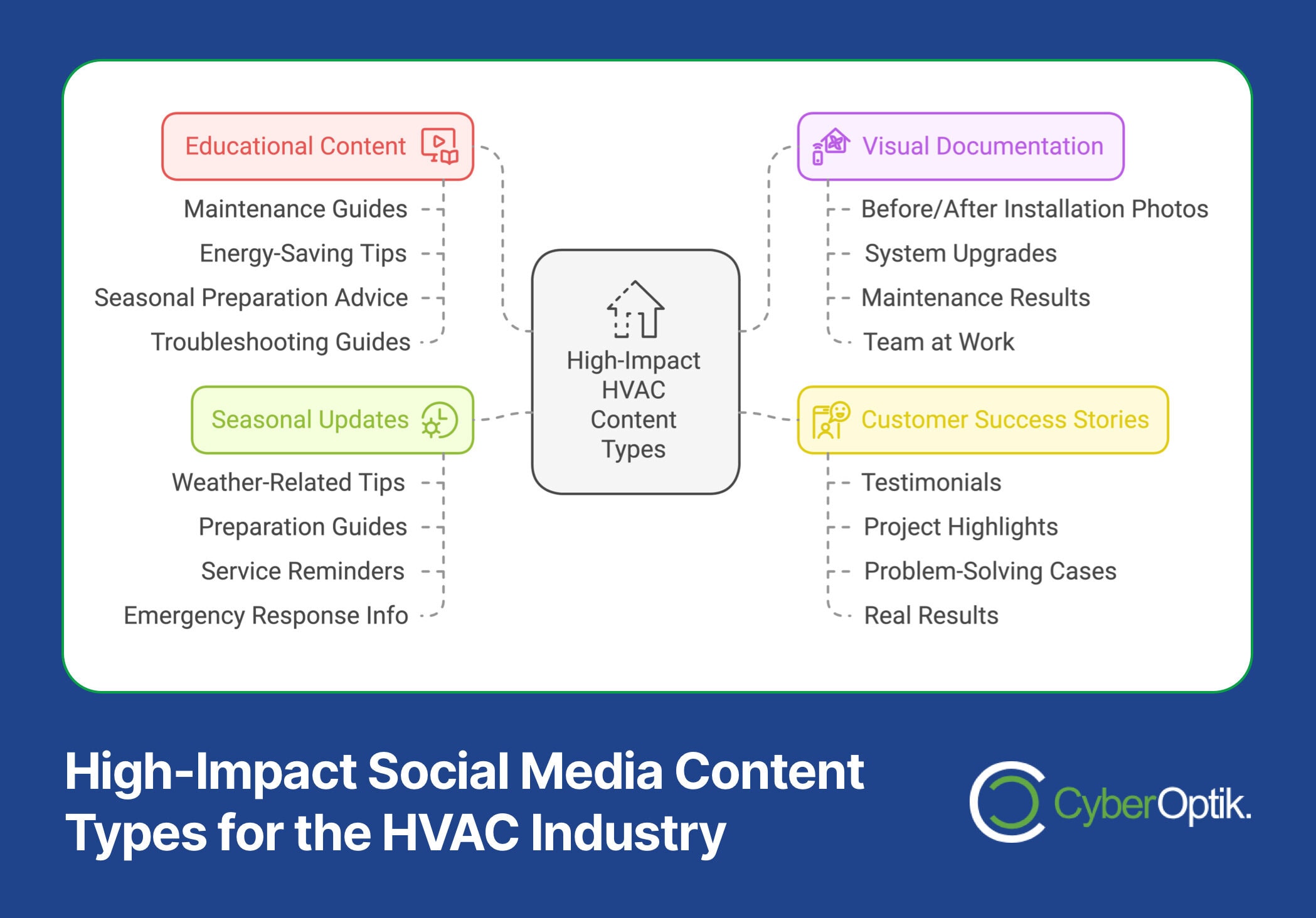Social media marketing transforms HVAC businesses into trusted industry authorities. Research shows that 82% of consumers use social media to research businesses before making purchasing decisions (Source: Social Champ).
This statistic underscores the critical role of social platforms in capturing and converting potential HVAC customers.
We’ve developed these strategies based on proven success patterns in the HVAC industry. Our approach combines platform-specific optimization with content strategies that drive engagement and generate qualified leads.
These methods work particularly well for companies ready to strengthen their social media presence and expand their customer base.
Strategic Platform Selection for HVAC Companies
Selecting the right social media platforms directly impacts your marketing success. Facebook, Instagram, and LinkedIn form the foundation of effective HVAC social media marketing. Each platform serves distinct purposes and reaches different audience segments.
| Platform | Primary Use | Content Type | Audience Focus |
|---|---|---|---|
| Community Building | Service Updates, Tips, Reviews | Homeowners, Property Managers | |
| Visual Storytelling | Before/After Photos, Team Stories | Younger Homeowners, DIY Enthusiasts | |
| B2B Networking | Industry Insights, Company News | Commercial Clients, Contractors |
Facebook serves as your primary engagement hub. The platform’s robust targeting capabilities and diverse content formats make it ideal for showcasing HVAC services and building community trust. Our social media advertising examples demonstrate how targeted content drives engagement.
Instagram’s visual nature perfectly suits HVAC companies. Share before-and-after installation photos, maintenance tips through Reels, and behind-the-scenes glimpses of your team at work. This visual storytelling builds authenticity and trust with potential customers.
LinkedIn positions your HVAC company as an industry authority. Share technical insights, company achievements, and industry news to connect with commercial clients and other professionals. This platform excels at B2B relationship building and establishing professional credibility.
Platform-Specific Optimization Tips

Each platform requires specific optimization strategies. Facebook posts perform best with educational content and customer success stories. Instagram demands high-quality visuals and engaging Stories. LinkedIn rewards detailed industry insights and professional updates.
Consider expanding to YouTube for detailed maintenance tutorials and TikTok for reaching younger homeowners. These platforms offer unique opportunities to showcase your expertise through video content while building brand awareness among different demographic segments.
Content Strategy Development for HVAC Social Media
Strategic content creation drives social media success in the HVAC industry. With 74% of people using social media to inform their purchasing decisions (Source: WebFX), developing compelling content becomes crucial for business growth. Our social media design psychology insights show that well-crafted content significantly impacts engagement rates.
High-Impact Content Types
Educational content establishes your HVAC company as an industry authority. Create maintenance guides, energy-saving tips, and seasonal preparation advice. This valuable information helps build trust while showcasing your expertise.
Visual documentation of your work demonstrates professional excellence. Share before-and-after photos of installations, system upgrades, and maintenance results. These visual stories provide powerful proof of your capabilities and workmanship.
Content Creation Framework
- Educational Posts: Maintenance tips, energy efficiency guides, troubleshooting advice
- Visual Content: Installation photos, team activities, behind-the-scenes operations
- Customer Success Stories: Testimonials, project highlights, problem-solving cases
- Seasonal Updates: Weather-related tips, preparation guides, service reminders
Authenticity matters in content creation. Share real team members solving actual HVAC challenges. Document genuine customer interactions and project completions. This approach builds credibility and resonates with potential customers seeking reliable service providers.
Seasonal Content Planning
Align your content calendar with HVAC service seasons. Create winter content focusing on heating system maintenance, spring content addressing AC preparation, and fall content highlighting system checkups. This seasonal approach ensures relevant, timely information reaches your audience when they need it most.
| Season | Content Focus | Key Topics |
|---|---|---|
| Spring | AC Preparation | System checks, cleaning tips, efficiency upgrades |
| Summer | Cooling Performance | Maintenance advice, energy savings, troubleshooting |
| Fall | Heating Readiness | System inspections, winter prep, efficiency tips |
| Winter | Heating Maintenance | Emergency services, preventive care, comfort solutions |

Content Distribution Strategy
Optimize content distribution across platforms. Share quick tips on Facebook, visual stories on Instagram, and detailed guides on LinkedIn. Cross-promote content while adapting formats to each platform’s strengths and audience preferences.
Monitor content performance through engagement metrics. Track which topics, formats, and posting times generate the most interaction. Use these insights to refine your content strategy and improve audience engagement continuously.
Audience Engagement Techniques
Building meaningful connections with your audience transforms followers into loyal customers. Research shows that 63% of Gen Z consumers prefer user-generated content over traditional promotional materials (Source: Optic Marketing Group). This insight shapes our approach to creating engaging social media interactions.
Building Authentic Connections
Authenticity drives engagement in social media marketing. Share real customer success stories and team experiences through your social media posts. Respond promptly to comments and messages, demonstrating your commitment to customer service excellence.
Create opportunities for meaningful dialogue with your audience. Ask questions about their HVAC experiences, concerns, and preferences. This two-way communication builds trust and provides valuable insights into customer needs.
Community Management Strategies
Develop a consistent community management approach. Address customer inquiries within hours, not days. Acknowledge positive feedback and handle concerns professionally. This responsive approach demonstrates your dedication to customer satisfaction.
Encourage customer reviews and testimonials on your social platforms. Share these authentic experiences while maintaining professional commentary. This user-generated content builds credibility and encourages others to share their positive experiences.
Interactive Content Ideas
- Live Q&A sessions addressing common HVAC concerns
- Polls about seasonal maintenance preferences
- Quick surveys about service experiences
- Behind-the-scenes glimpses of technical work
- Employee spotlight features highlighting expertise
Implement regular engagement activities that provide value to your audience. Host monthly maintenance tip sessions, seasonal preparation workshops, or energy-saving discussions. These interactive elements keep your audience engaged while showcasing your expertise.
Crisis Communication Protocol
Establish clear guidelines for handling challenging situations on social media. Address negative feedback professionally and move sensitive discussions to private channels when appropriate. This approach maintains your reputation while demonstrating commitment to customer satisfaction.
Monitor conversations about your brand across platforms. Engage with mentions of your company, whether positive or negative. This proactive approach shows attentiveness and helps maintain a positive online presence.
Advertising and Promotion Strategies
Strategic social media advertising amplifies your HVAC company’s reach and generates qualified leads. With 95% of teens having smartphone access (Source: Optic Marketing Group), targeted mobile advertising becomes crucial for reaching next-generation homeowners.
Platform-Specific Ad Strategies
Each social platform offers unique advertising capabilities for HVAC companies. Our advertising expertise shows that platform-specific optimization significantly improves campaign performance. Target specific demographics and locations while maintaining consistent brand messaging across platforms.
| Platform | Ad Format | Best Use Case |
|---|---|---|
| Lead Generation Ads | Service appointment bookings, maintenance plans | |
| Story Ads, Carousel Posts | Visual project showcases, before/after results | |
| Sponsored Content | Commercial HVAC services, B2B partnerships |
Budget Allocation Strategy
Distribute your advertising budget based on platform performance and seasonal demands. Increase spending during peak seasons while maintaining consistent brand presence year-round. Monitor return on ad spend to optimize budget allocation continuously.
Implement strategic retargeting campaigns to reach users who’ve shown interest in your services. This approach maximizes advertising efficiency by focusing on warm leads most likely to convert.
Ad Creative Best Practices
- Clear, benefit-focused headlines
- High-quality images of actual work
- Compelling calls-to-action
- Mobile-optimized formats
- Location-specific messaging
Create ads that address specific customer pain points. Highlight emergency services, maintenance benefits, or energy-saving solutions. This targeted approach resonates with customers actively seeking HVAC solutions.
Campaign Optimization
Test multiple ad variations to identify top performers. Experiment with different images, headlines, and calls-to-action. Use these insights to refine your advertising strategy and improve conversion rates.Integrate your social media advertising with broader marketing efforts. Connect social campaigns with your HVAC marketing strategy to create cohesive customer experiences across all channels.
Performance Tracking and Analytics
Data-driven decision-making powers successful social media strategies. With platforms like YouTube receiving 74.8 billion monthly visits (Source: TopSeer Marketers), understanding performance metrics becomes crucial for maximizing reach and engagement.
Essential Performance Metrics
Track key performance indicators that align with your business objectives. Focus on metrics that directly impact your bottom line rather than vanity metrics. Our social media management experience shows that targeted measurement drives better results.
| Metric Category | Key Metrics | Business Impact |
|---|---|---|
| Engagement | Likes, Comments, Shares | Content Effectiveness |
| Reach | Impressions, Audience Growth | Brand Awareness |
| Conversion | Click-through Rate, Lead Generation | Revenue Generation |
| Customer Service | Response Time, Resolution Rate | Customer Satisfaction |
Analytics Tools Implementation
Implement comprehensive analytics tools to track performance across platforms. Utilize native platform analytics alongside specialized tracking tools. This combination provides deeper insights into campaign effectiveness and audience behavior.
Set up custom tracking parameters for different content types and campaigns. Monitor how various content formats perform across platforms. Use these insights to optimize your content strategy and resource allocation.
ROI Measurement Framework
- Track cost per lead across platforms
- Monitor customer acquisition costs
- Measure conversion rates by campaign
- Calculate lifetime value of social media customers
- Analyze return on ad spend (ROAS)
Connect social media metrics to business outcomes. Track how social engagement translates into service appointments, installations, and maintenance contracts. This approach demonstrates the tangible value of your social media investment.
Performance Optimization Process
Establish a regular review cycle for performance data. Analyze trends, identify successful patterns, and adjust strategies accordingly. This continuous improvement process ensures your social media efforts remain effective and efficient.
Create performance benchmarks based on historical data and industry standards. Compare your results against these benchmarks to identify areas for improvement. Use these insights to refine your social media strategy continuously.
Implementation Roadmap
Successfully implementing social media strategies requires systematic execution. With 78% of Americans maintaining at least one social networking account (Source: WebFX), a structured approach ensures you reach your target audience effectively.
90-Day Implementation Plan
Break down your social media implementation into manageable phases. Start with foundation building, progress to content creation, and culminate in full-scale engagement. This methodical approach ensures sustainable growth and consistent performance.
| Timeline | Focus Areas | Key Actions |
|---|---|---|
| Days 1-30 | Foundation Setup | Platform optimization, brand guidelines, team training |
| Days 31-60 | Content Development | Content creation, scheduling system, engagement protocols |
| Days 61-90 | Full Engagement | Community building, advertising campaigns, performance tracking |
Resource Allocation Guidelines
Allocate resources strategically across different social media functions. Balance content creation, community management, and advertising efforts. Our social media design insights show that proper resource distribution significantly impacts success.
Invest in essential tools and platforms that streamline your social media operations. Prioritize solutions that integrate with your existing business systems and provide measurable returns on investment.
Common Implementation Challenges
- Inconsistent posting schedules
- Inadequate response times
- Poor content quality control
- Ineffective audience targeting
- Insufficient performance monitoring
Address potential obstacles proactively by establishing clear protocols and responsibilities. Create contingency plans for common challenges like staff changes or technical issues. This preparation ensures continuous social media presence and engagement.
Team Training and Development
Develop comprehensive training programs for team members managing social media. Cover platform best practices, brand voice guidelines, and crisis management procedures. Regular training updates keep your team aligned with evolving social media trends.
Establish clear roles and responsibilities within your social media team. Define workflows for content approval, customer response handling, and performance reporting. This structure ensures efficient operation and consistent quality.
Future-Proofing Your Social Media Strategy
Adapting to evolving social media trends ensures long-term success. With 45% of teens being online almost constantly (Source: Optic Marketing Group), preparing for future digital engagement patterns becomes crucial for HVAC companies.
Emerging Trends for 2025
Stay ahead of industry changes by embracing innovative social media approaches. Focus on video content, artificial intelligence integration, and enhanced customer experience features. Our digital marketing forecasts indicate these elements will dominate future strategies.
Incorporate augmented reality features and interactive content into your social media presence. These technologies enable virtual system demonstrations and maintenance tutorials, enhancing customer education and engagement.
Technology Integration Priorities
- AI-powered chatbots for customer service
- Virtual reality system demonstrations
- Automated scheduling through social platforms
- Smart home integration showcases
- Predictive maintenance notifications
Invest in technologies that enhance customer experience while streamlining operations. Prioritize solutions that integrate seamlessly with existing systems and provide measurable benefits to your customers.
Adaptation Strategies
| Area | Current State | Future Development |
|---|---|---|
| Content Delivery | Static posts and images | Interactive AR/VR experiences |
| Customer Service | Manual responses | AI-assisted support systems |
| Lead Generation | Traditional forms | Automated social conversion |
| Performance Analysis | Basic metrics | Predictive analytics |
Continuous Improvement Framework
Establish a system for regular strategy evaluation and updates. Monitor industry innovations, competitor activities, and platform changes. This proactive approach ensures your social media presence remains competitive and effective.
Build flexibility into your social media infrastructure. Create processes that can adapt to new platforms and features while maintaining consistent brand messaging and customer service quality.
Frequently Asked Questions About HVAC Social Media Marketing
Address common concerns and questions about implementing social media strategies for HVAC companies. Our experience helping businesses develop effective social media presences has identified these key questions.
Which social media platform is best for HVAC companies?
Facebook typically provides the strongest foundation for HVAC companies due to its broad demographic reach and robust advertising capabilities. However, a multi-platform approach including Instagram for visual content and LinkedIn for B2B connections often yields the best results.
How often should HVAC companies post on social media?
Maintain consistent posting schedules with 3-5 weekly posts on primary platforms. Quality matters more than quantity. Focus on providing valuable content that addresses customer needs and showcases your expertise.
What type of content generates the most engagement?
Before-and-after project photos, maintenance tips, and educational videos typically generate high engagement. Customer testimonials and behind-the-scenes content also perform well, building trust and demonstrating expertise.
How can we measure social media ROI?
Track key metrics including lead generation, appointment bookings, and customer acquisition costs. Monitor engagement rates and conversion metrics through platform analytics tools. Connect social media activities to actual service calls and revenue.
Effective social media marketing transforms HVAC businesses into recognized industry authorities. By implementing these strategies while working with a professional social media team, your HVAC company can build stronger customer relationships and drive sustainable growth.
Success in social media marketing requires consistent effort, strategic planning, and continuous adaptation. Focus on providing value to your audience while maintaining authentic engagement across platforms.
Next Steps
Ready to elevate your HVAC company’s social media presence? Our team specializes in creating and implementing effective social media strategies for HVAC businesses. Contact us to discuss how we can help you achieve your digital marketing goals.
Schedule a free consultation to discuss your HVAC company’s social media strategy. Our experts will analyze your current presence and provide actionable recommendations for improvement.




